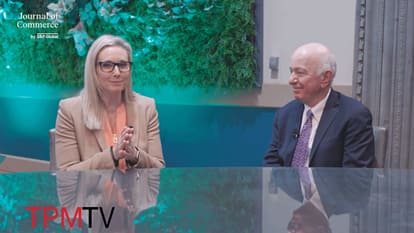- Program
- What's New
- Speakers
- Who's Attending
- TPM Community
- Partners

TPM Partnership
Partnership places your company in a position of authority and enables you to build and strengthen your relationships, visibility and reputation with major shippers
LEARN MORE - Media

TPM TV
Episodes of exclusive TPM content featuring interviews of key stakeholders and attendees.
WATCH NOW - About

About TPM
The must-attend conference for the trans-Pacific and global container shipping and logistics community
LEARN ABOUT TPM - Get Updates
- FAQ's
Sessions With Mark Szakonyi
Sunday, 3 March
-
12:00pm - 12:45pm (PST) / 03/mar/2024 08:00 pm - 03/mar/2024 08:45 pm
Shipper Briefing
A special, off-the-record discussion and preview of TPM24 and the issues dominating today's containerized ocean shipping industry. Don't miss this opportunity to hear from the senior JOC editorial team about the key issues to be discussed during the conference, and to convey what questions you'd like addressed before leaving Long Beach. Reserved Only For Shippers
- Speakers:
- Tammy Auld
- Mark Szakonyi
Monday, 4 March
-
10:30am - 11:30am (PST) / 04/mar/2024 06:30 pm - 04/mar/2024 07:30 pm
Container Shipping Outlook: Beyond the Down Cycle
In the wake of the massive rate hikes and record profitability for ocean carriers in 2021-2022, the container shipping industry has returned to pre-pandemic/historical profitability levels. And yet services are far from normal: The capacity-sucking routing of capacity away from the Suez Canal because of fears of Houthi rebel attacks in the Red Sea, coupled with Panama Canal’s drought restrictions, is jolting container spot rates from Asia to North America and Europe. The surge, however, may be short-lived given the modest expectations for import growth in North America during a time when there’s plenty of ship capacity to spare. Facing an inflationary environment restraining demand growth, carriers ultimately will have to reduce capacity, barring another shock to capacity due to disruption. For now, that’s come through more aggressive blanking of sailings, much to the chagrin of shippers and forwarders. At the same time, maritime regulators are becoming more aggressive, with the Federal Maritime Commission's new mandate from Congress and the sunsetting of Europe’s block exemption. That’s forcing carriers to reconsider the risk exposure of vessel-sharing agreements and their networks. Europe’s new emission trading system is giving carriers a taste of the higher costs tied to decarbonization that they’ll need to pass through to customers. More generally, shippers remain reluctant to embrace more expensive green shipping services, even as carriers invest billions of dollars for ships that will be able to run on cleaner fuels. While it may be a familiar down cycle of overcapacity, new geopolitical and regulatory challenges, coupled with a dimming global economic outlook, promise something entirely new. This session, an annual TPM focal point, will take stock of the trans-Pacific trade and cast an eye to what is shaping up to be an uncertain and angst-filled 2024. In the process, it will answer the following questions:
• How big a drag is the down cycle on carrier profitability?
• What is the supply-demand outlook for 2024 and 2025?
• How are major external and internal forces reshaping networks?
• How are carriers managing decarbonization investment risks?
-
02:35pm - 03:20pm (PST) / 04/mar/2024 10:35 pm - 04/mar/2024 11:20 pm
The Evolution Accelerates
The container shipping landscape continues to evolve in unrecognizable ways, historically speaking, with ocean carriers increasingly blurring between traditional carriers, forwarders, and terminal operators. Maersk’s transformation into a global integrator of container logistics is unprecedented for a traditional carrier, a direction reinforced by multiple acquisitions and the recent commitment to 90% schedule reliability and a hub-and-spoke network announced as part of its new Gemini Cooperation with Hapag-Lloyd. The attacks on shipping in the Red Sea and subsequent mass-diversions of container ship routings around Africa show the elevated risks that containerized supply chains continue to be subjected to, which will prompt further evaluation by shippers of sourcing strategies and logistics partners. Where is this headed and what will it mean in terms of the companies and service offerings able to support shippers? In this session, Ulrik Sanders, who leads BCG’s shipping practice, and Johan Sigsgaard, who leads Maersk’s ocean product, will discuss topics including network value propositions and the use of advanced tech like AI in digitizing shipping and industry trends overall.- Speakers:
- Ulrik Sanders
- Johan Sigsgaard
- Mark Szakonyi
Tuesday, 5 March
-
11:35am - 12:05pm (PST) / 05/mar/2024 07:35 pm - 05/mar/2024 08:05 pm
Strengthening Global Supply Chains: The Biden Administration Agenda
Greater geopolitical volatility has driven the US federal government toward an ambitious effort to shore up supply chains critical to national security and the safety of its allies. The Biden administration’s effort rests on three pillars: investment at home, collaboration with allies, and protecting against malign actors. In his role at the Department of State, Ramin Toloui supports that mission by advocating coherent economic policy across government departments. Toloui, who heads the Bureau of Economic and Business Affairs, will highlight how the administration is stepping up to new threat levels for the US economy and security and then address a wide range of issues with Journal of Commerce Executive Editor Mark Szakonyi.
- Speakers:
- Ramin Toloui
- Mark Szakonyi
-
05:05pm - 05:45pm (PST) / 06/mar/2024 01:05 am - 06/mar/2024 01:45 am
National Shipper Advisory Committee: Priorities and Observations for 2024
Since its founding in 2021 under the National Defense Authorization Act, the National Shipper Advisory Committee has become an active and vocal advocate for shippers before the Federal Maritime Commission. The NASC’s formation has coincided with a more active agency led by FMC Chairman Daniel Maffei and with a mandate for reform thanks to shipping legislation enacted in 2022. Comprised of 12 import and 12 export members, the NASC weighs in and makes recommendations on a range of issues high on shippers’ agenda, including intermodal chassis pools, dwell fees, ERD (earliest return date), rail detention and demurrage billing, and costs associated with government holds on cargo. The advisory committee is advocating for requirements on ocean carriers to report consistent vessel-level data, as well as container-level and intermodal data elements maintaining historical time stamps of key milestones in a public format. TPM attendees will hear from NSAC members on their priorities for 2024. This session will be a companion to a formal NSAC meeting open to all taking place on-site at TPM at 2:30 p.m. on Wednesday, March 6.
Wednesday, 6 March
-
09:05am - 09:50am (PST) / 06/mar/2024 05:05 pm - 06/mar/2024 05:50 pm
Reducing Scope 3 Emissions: A Microsoft Case Study
Microsoft is decarbonizing its supply chain, supplying the critical components underpinning the company’s cloud platform by integrating carbon-emission efforts into core decision-making — and delivering results. Microsoft has made significant investments on green products and requires its suppliers to meet its own carbon-reduction program, challenging transportation providers and manufacturers to take the same wholistic approach it chartered in 2020. From vision to nut-and-bolts, Microsoft Cloud executives will share how they have reduced their division’s carbon footprint by 13% within the last year on volume growth of almost 50% increasing carbon efficiency by 30%, and where they still need to go. Handling relatively modest volumes for a technology powerhouse, this Microsoft case study will have implications and takeaways for shippers large and small as they attempt to need to reduce Scope 3 emissions.
- Speakers:
- Nico De Golia
- Marco Eipper
- Mark Szakonyi

